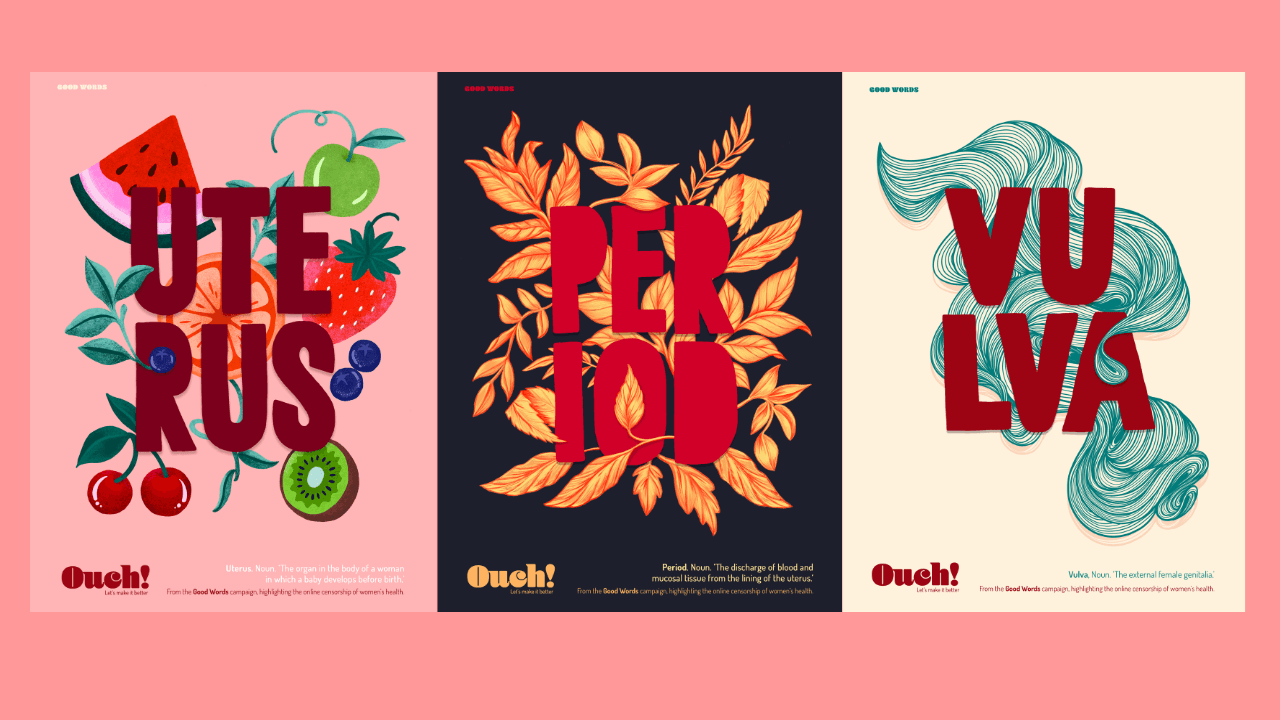In response to widespread suppression of women’s health vocabulary, health creative studio Ouch! launches the GOOD WORDS campaign: a series of posters highlighting how essential terms such as “vulva,” “uterus,” and “period” are censored by digital platforms, forcing women to navigate a growing “euphemism economy” of coded language just to find information online.
The campaign calls out the culture of silence, inviting anyone to download free, high-impact prints for use in public spaces and digital sharing. Recent research, including the June 2025 CensHERsip White Paper, documents that up to 95 per cent of women’s health businesses in the UK say their educational content is routinely shadowbanned, hidden, or rejected by algorithms on social and advertising platforms.
In June, more than 190 organisations, founders, health professionals and campaigners have co-signed an open letter calling on social media platforms to end the routine censorship of women’s health content online. It followed formal complaints filed in March 2025 by CensHERship and The Case For Her under the EU Digital Services Act (DSA). These complaints, submitted on behalf of six women’s health companies, documented biased moderation, lack of transparency, and failures to provide effective appeal mechanisms. Despite clear evidence and growing public concern, no meaningful response or action has been taken to date.
Key terms describing anatomy, menstrual health, menopause, and postpartum care are flagged as “adult content” or “unprofessional,” while equivalent male health language remains visible.
Further, research by CASANEGRA Studio shows this goes beyond erasure, revealing how algorithmic content moderation distorts language and stifles vital health conversations.
Their analysis reveals an euphemism economy flourishing across social platforms, where medically precise terms like vulva, uterus, and period mutate into code words or symbols to evade banishment: “down there”, “seggs” or “that time of the month”. As a result, clinical language is now treated with the same severity as pornography, pushing women toward euphemisms like *“down there” or “per!od.”
This linguistic regression harms health literacy and deepens shame around female anatomy, especially for Gen Z and Gen Alpha, who rely on these platforms for information.
According to Carrie Kenyon, founder of Ouch!:
“There is something refreshing about a traditional print campaign as a call to arms against the online censorship of women's health.
Using a range of visual icons, and with inspiration taken from the words themselves, we created this series to signal that all words associated to women's health are first and foremost good words.”
Taking a stand beyond the digital, the campaign’s print run acts as a symbol of leaving behind the very platforms perpetuating this censorship, reclaiming trusted physical spaces like GP offices, libraries, and community centres. Alongside print, the free digital versions encourage sharing and reconquering of digital spaces through community-driven efforts on social media.



Would you like to write the first comment?
Login to post comments